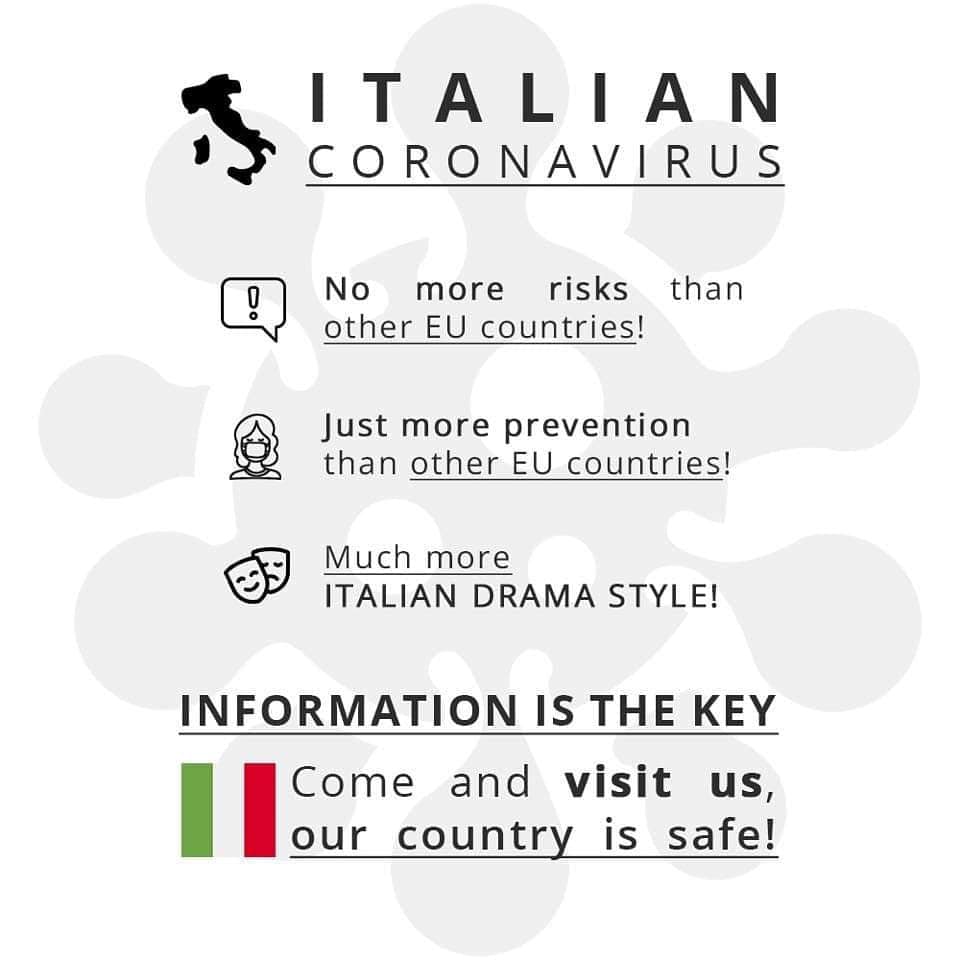A Quick Guide on How to Survive and Communicate during a Global Crisis

At the time of writing this post, we already know that most businesses, big or small, are directly or indirectly affected by the Coronavirus COVID-19 pandemic. Granted, a few industries (travel, tourism, relocation, hospitality, HoReCa, and aviation come to mind) have been hit the hardest.
But this doesn’t mean that we can’t see the effects everywhere.
Sadly, financial analysts say that this is just the beginning. We can expect to see rolling recessions and more and more companies affected by the pandemic.
So, what can you do to stay alive — as an individual and as a company? How can you help?
I dusted off my college courses on communication during crises, added some of my hands-on practical experience plus some of our agencies’ clients’ stories to put together a quick guide.
Grab yourself a cup of tea (or a glass of wine, almost everything is OK now) and let’s take a look at:
- How to communicate during a global crisis
- How NOT to communicate during a global crisis
- Creative ways to find new revenue streams for your business
- How can you help (and talk about it)
You’ll see that these three chapters aren’t completely separated from each other. The way you communicate and help now can help you generate new revenue streams — now or in the future.
Ready? Let’s dig in.
-
How to Communicate During a Global Crisis
First things first: whatever you do, no matter if and how your company is affected by the pandemic or another type of crisis, YOU SHOULD NEVER STOP COMMUNICATING.
Sorry for screaming this at you but it’s really important.
Don’t shut down.
Remember that people are online now more than ever. And some of these people are (or can become) your customers.
Let’s take a look at some scenarios.
Is your business slowing down or shutting down completely for the foreseeable future?
This means that you are directly affected by the crisis. This is not the time to put on a brave face. Be honest and transparent.
Announce your new schedule through every means at your disposal:
- Email newsletters
- Social media: both in stories (where available) and on your feed
- Pin posts on social networks where this option is available
- Create a banner on your website’s homepage — make sure it’s very visible
- Send personal emails to the people that are affected the most — you don’t want them leaving their homes to find your doors shut.
Be brief but explain the reasons why you decided to limit your activity or shut down completely. Most likely, it has something to do with your employees’ and your customers’ safety so say it, don’t assume people will understand from context.
Not shutting down but changing the rules of the game? Say it!
Service companies are the best example here, especially those that are 100% online. They rarely interact with their clients in person, so for them, it’s pretty much business as usual. Still, your clients want to know that you are a responsible company, so announce:
- What measures you have taken to protect your employees (switching to remote work, for instance). Salesforce did a good job at this:
- Will there be any delays in your usual services?
- Can you take up additional emergency work?
- Will there be any changes in your usual schedule?
Bottom line: communicate even the smallest change, especially when it’s meant to reassure your current clients. Remember that everyone is panicking so your goal should be to remain an oasis of calmness and to communicate that you are handling the situation as best as possible.
Answer queries in record time
In “normal” times, 37% of customers expect a response from a business in less than an hour. We don’t have any studies (yet!) about customers’ patience during a crisis but, as you can imagine, they’re running low on it.
Here’s what you can do to minimize waiting time:
- If possible, supplement your customer support staff.
- Use chatbots to answer the most frequent questions.
- Create an updated FAQ section on your website where people can find the answers to recent developments themselves. Make sure to update it frequently. Link to it on social media and on all your communication channels. This will help reduce the number of people who still need to speak to a human agent.
- Take a look above at the suggested communication tactics. As long as you are proactive and transparent, you will get through this and you will help get your clients through this too.
Key takeaway: I feel like this needs to be said again. Transparency and proactiveness are key during uncertain times. If you have answers, give them before people ask.
So far, so good. But even with all these tactics in place, you still have the chance to blow it all away with one single tweet or improper email.
Here’s what to avoid in your communication in times of crisis:
2. How NOT to Communicate During a Global Crisis
As I’m writing this article, governments across the world are taking measures to combat the spread of Coronavirus COVID-19. We’re talking about almost EVERY government (North Korea is, expectedly, silent on this) on every continent in an unprecedented show of unity and responsiveness.
Now, you may not agree with your government’s measures or with those taken by other governments. But do remember that, as a business, it is completely irresponsible (and in some cases illegal) to entice people to disobey official rules or even recommendations.
So:
- DO NOT take it upon yourself to recommend cures and protective measures unless you are a medical clinic (ideally with a specialization in epidemiology).
- You CAN share or retweet official comms but DO NOT share anything that you haven’t verified and then verified again. Ideally, only share comms from the official government accounts or WHO (World Health Organization).
- DO NOT disobey the official rules and recommendations yourself. If your government asked to cancel events and avoid large (or any) gatherings, DO NOT attempt to violate this rule and call people to your bar/pub/restaurant/hotel.
- Refrain from sharing memes. Yes, we all need a laugh right now. But stick to sharing funny things on your personal accounts. Think about it this way: what if one of your customers is currently battling this virus? Or if someone they love is? Would they appreciate your funny tweet about toilet paper shortage?
- DO NOT take this in stride. Despite your personal beliefs, this is not the time to say “no biggie, it’s just a common cold”. As long as WHO doesn’t agree, keep your opinions to yourself.
Does this sound like censorship to you? It might. But here’s what can happen if you take the light approach. This image was massively shared by hotels, pubs, and restaurants in Italy.
Image via Le Torri di Bagnara
Granted, when the trend first started, businesses in other areas except for the North of Italy were seemingly safe. But things changed quickly. As I’m writing this, it’s been almost a week since the entire country has been in lockdown and the image is STILL live on a hotel’s website.
It is, perhaps, an oversight. Understandably, everyone was trying to save their business when the panic was moderate. When things escalated, no one had time to take the optimist images down.
However, even if you DO take them down, the internet never forgets. You don’t want to be that reckless business who thought of profit before the guests’ safety, do you?
Again, if you have a hotel, a bar, a pub, a restaurant — DO NOT tell people it’s safe to travel at a time when everyone recommends against. Stop advertising tours and parties. You will waste your money and lose future clients in the process.
I know you’re worried about your business and staying afloat — we all are.
So let’s talk about staying afloat and even generating new revenue streams.
3. Creative Ways to Find New Revenue Streams for Your Business
If you have a brick-and-mortar business, like the hotels, bars, pubs mentioned above, you are most likely hit badly by the pandemic. But there are responsible ways to make ends meet:
- Instead of calling people to your location NOW and putting them at risk, offer vouchers that they can buy online and use when the crisis is over. People love supporting local businesses and they will appreciate you taking care of them.
- Be flexible. Does your hotel need cash NOW? Tell people they can book their stay for a later day and be assured that they can cancel or reprogram anytime.
- Adapt. Can your yoga class be offered online? Can you stream your course live or record it and upload it later? Could you deliver food, drinks or other goods in complete safety? Bottom line: move everything that can be moved online.
- Innovate. I know, vouchers can mean very little to a small coffee shop. But what if you could do more? People are stuck at home now, so why not offer a barista class — online, of course?
- Support your fellow businesspeople. Can you offer free consulting services? Or perhaps you could partner with another local business to offer discounted package deals — deliver food AND wine. Or human food plus food for your clients’ pets.
- Offer small incentives. Free transportation. A free pet toy. Free dessert. A complimentary 15-minute strategy call for any services sold during this time.
Now is the time to let creativity shine. You’ve got just two prerequisites: don’t be insensitive and make sure people really need what you’re selling now.
4. How Can You Help? (And Talk about It)
You don’t have to be an NGO to be part of the solution. Everyone can play a part, no matter how small in helping to end a crisis sooner rather than later.
In my opinion, just playing your part should be enough of an incentive. But if it’s not, think about it this way: everyone loves companies that do more than count their profits. For instance, AirBnB is getting a massive backlash for refusing refunds to people who are too scared to travel. Corporate responsibility is not a novel thing but it’s becoming more and more the norm.
Draw inspiration from your NGOs and regular citizens. Here are some amazing examples that are happening as we speak in various countries all over the world (and that you can implement, too!):
- Student associations helping seniors with their groceries (for free, of course — the seniors only pay for the cost of the goods, not the delivery).
- Fast-food chains offering free food to people who are in mandatory quarantine in Europe.
- Countless companies and individuals donate to medical research.
- Restaurants that are shutting down offer their food ingredients to vulnerable categories instead of letting them go to waste.
- Restaurants are closed to the public but operate with a skeleton crew and deliver food to nearby areas (no delivery fees).
- NGOs and individuals make sure that hospitals have everything they need and pitch in whenever they can — with money or actual solutions and medical supplies.
- Programmers create various graphs and mathematic models that help predict the evolution of the disease and/or display measures taken by the government in real-time.
The examples are countless. And if there’s one good thing in a crisis, it’s the show of solidarity from all over the world. We are all in this together, so let’s act like it.
Communicating During Crisis — Final Words
Of course, there are a lot of things to say on the matter. There are thousands of books written on crisis communication and, with every new terrible situation, we discover that there is more to say about it.
But if I were to say one thing, it’s this one: during these uncertain times, talk to your clients as if you were talking to your partner or your parents. Understand that they could be more vulnerable than you and that they need you to protect them in any way you can.
We cannot thrive separately, only together. So, instead of thinking about the dollar you can earn today, think about the $10 you could make tomorrow or next month, when everyone is safe — in part, thanks to you.
Need additional help with your marketing or communication? I have opened up 10 slots for the Sherlock Holmes call this week. Normally priced at $380, you can now book a quick 15-minute call with me for free. First come, first served. It doesn’t matter what industry you’re in or if you want to keep working with us. I just want to help. Hit us up in the contact section — we’ll answer everyone but we can’t guarantee the spots won’t sell out too quickly.



